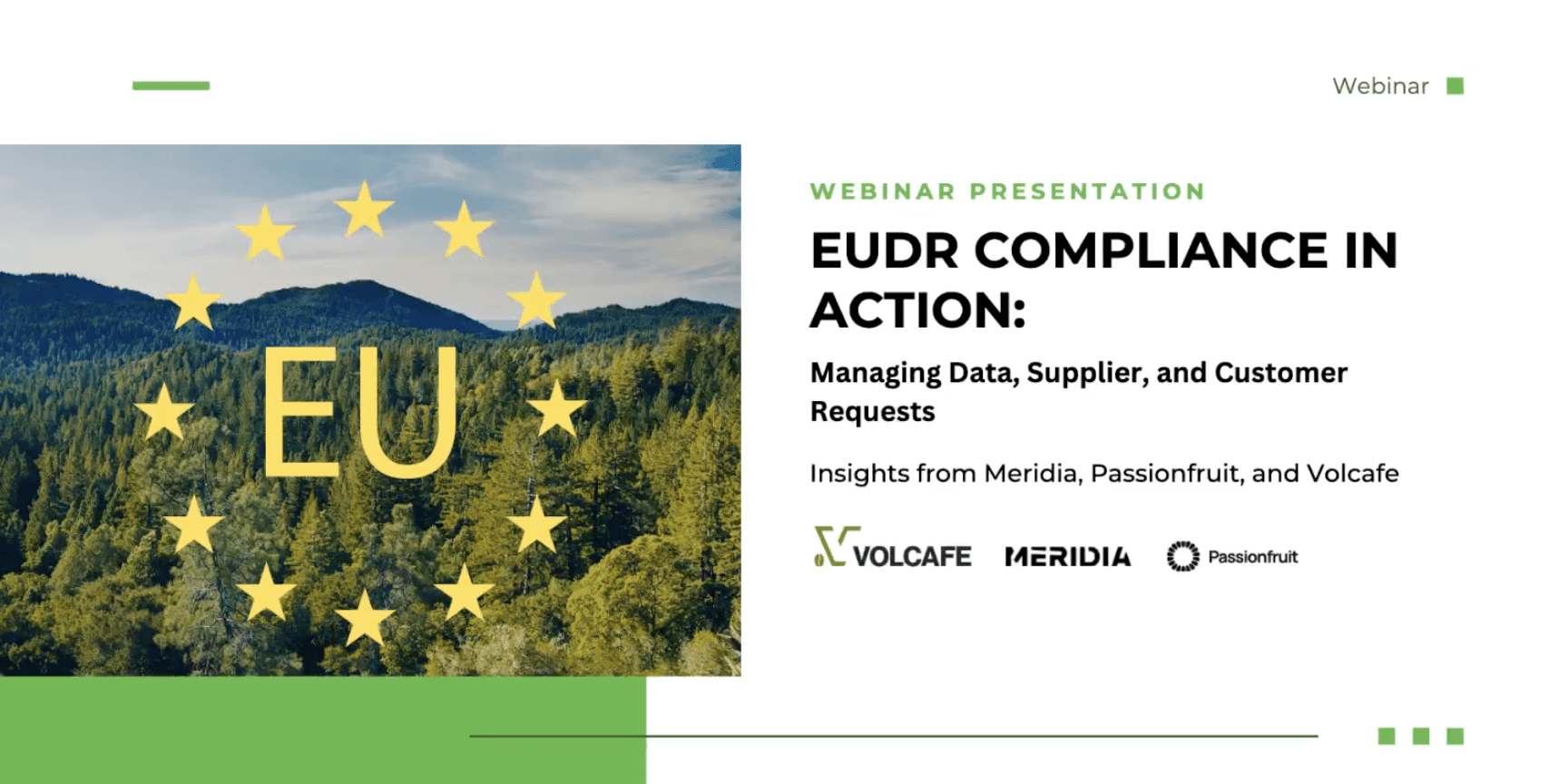Thursday, April 10, 2025
In this blog, we highlight the key takeaways from the recent EUDR webinar featuring experts from Meridia, Volcafe, and Passionfruit.

Maikel Fontein
Apr 10, 2025
3
min
The recent webinar on European Union Deforestation Regulation (EUDR) compliance provided invaluable insights for companies navigating the complexities of sustainable supply chains. Hosted by experts from Meridia, Passionfruit, and Volcafe, the session delved into field data verification, handling compliance requests, and real-world challenges in ensuring a deforestation-free and legally compliant supply chain. Here are the key takeaways from each of the speakers' sessions:
Meridia: Tackling Field Data Verification and Risk Management
Thomas from Meridia kicked off the webinar by sharing the importance of accurate field data when it comes to deforestation risk assessments and EUDR compliance. He emphasized that while many companies are multiple tiers removed from the fields where their products are sourced, ensuring the integrity of the data collected is paramount.
Meridia, with its specialized software, plays a key role in identifying data quality issues, deforestation risks, and legal compliance within supply chains. A major challenge in field data verification is dealing with "dirty data"—inaccurate or inconsistent information that can skew deforestation and legality assessments. Meridia’s software runs critical data quality tests and identifies issues such as self-intersections, overlapping plots, and impossible data points that can cause delays and cost inefficiencies.
Meridia also focuses on deforestation detection, noting that, on average, about 2% of farm plots show signs of deforestation. For crops like coffee, this number can be lower, but the implications of a deforestation finding are significant for farmers and suppliers, as it can result in exclusion from compliant supply chains. Thomas highlighted the importance of taking swift action once deforestation is detected, including field verification, supplier engagement, and creating segregation protocols for affected volumes.
The key takeaway from Meridia’s insights is that verifying and managing field data isn’t a one-off task; it’s an ongoing process that requires proactive monitoring, especially given the growing regulatory demands of EUDR. Early preparation and consistent data verification can save significant time and money.
Passionfruit: Efficiently Managing Customer, Supplier, and NGO Compliance Requests
On the other hand, Passionfruit’s focus was on helping companies streamline their processes for handling the constant influx of compliance requests—from customers, suppliers, and NGOs. Michael from Passionfruit explained how their platform helps companies automate the answering of ESG (Environmental, Social, and Governance) questionnaires, freeing up teams from manual, repetitive tasks.
In particular, Passionfruit has developed a system that handles the different formats in which customers and NGOs request information—whether that be in Excel, Word, or online portals. The real challenge, however, lies in ensuring that internal data remains consistent and accurate. Michael emphasized that as EUDR regulations evolve, internal data needs constant updates, and a robust tracking system is critical to avoid human error and miscommunication between departments.
Another significant challenge mentioned was the lack of transparency regarding what data gets shared with whom. Passionfruit’s solution to this is maintaining an “answer library”—a centralized repository where all responses are stored and updated regularly. This ensures that teams can access the most recent and accurate answers when responding to compliance requests. Furthermore, automation plays a crucial role in managing these requests, allowing companies to send responses in the correct formats, ensuring consistency and reducing manual errors.
Passionfruit’s key takeaway was to adopt a “systems thinking” approach. Instead of firefighting last-minute requests, companies should focus on creating streamlined systems for responding to requests in a timely, efficient, and accurate manner.
Volcafe: The Challenges of Data Collection in Coffee Supply Chains
Raphaelle and Claudio from Volcafe shared their firsthand experiences of implementing EUDR compliance within their coffee supply chain. Volcafe, as a green coffee bean trader, is deeply involved in sourcing coffee from smallholder farmers across 15 different origins. They are directly impacted by the complexities of data collection, deforestation risk assessments, and legality checks.
One of the biggest challenges Volcafe faces is managing the scale of data they receive from suppliers. With hundreds of thousands of farmers and suppliers to track, processing and analyzing this data in a timely and actionable manner is critical. Raphaelle explained how their team works closely with Meridia to assess deforestation risks, while also considering legality topics such as protected areas and land tenure.
A major challenge, according to Raphaelle, is the variation in data formats and the different interpretations of deforestation and legality risks from one supplier to another. The lack of standardized methods for risk assessments complicates the verification process and creates inefficiencies. Volcafe’s team must reconcile these differing interpretations and ensure consistency when responding to customer or authoritative body audits.
The key insight from Volcafe was the need for technological solutions to streamline data collection and verification. However, Claudio added that beyond technology, the real challenge lies in ensuring that all teams, both internal and external (i.e., suppliers), are trained to interpret and manage this data in a standardized way.
The Road Ahead: Preparing for EUDR Compliance
The webinar’s key takeaway was clear: the increasing regulatory requirements of EUDR are pushing companies to rethink their supply chain management and data verification processes. While Meridia emphasized the need for accurate and verified field data, Passionfruit showed how automating the response to customer and supplier compliance requests can save time and reduce risks. Volcafe, meanwhile, illustrated the challenges of managing data at scale and ensuring consistent compliance across a diverse global supply chain.
Start Early: Laying the Foundation for EUDR Compliance
The EUDR presents a significant challenge due to its complexity and evolving nature. Thomas from Meridia was clear on this point: the process of verifying field data, assessing deforestation risks, and ensuring legality compliance requires time and attention to detail. Companies like Volcafe have already started their preparations months in advance, and Meridia strongly advises the same approach. The key here is not to wait for regulatory deadlines to dictate your actions.
Why Start Early?
Deforestation Verification Takes Time: According to Meridia, field data verification is not something you can rush through. It can take anywhere from two to eight months depending on the number of cases being investigated. The process involves several layers, from desk verification using satellite imagery to field inspections, which cannot be accelerated without compromising accuracy.
Ongoing Monitoring: EUDR compliance isn’t a one-off project; it's an ongoing effort. Regulations and customer expectations will evolve, and your company’s internal policies will likely change as well. Starting early allows you to build a robust system that can continuously adapt to new regulations and changing data needs.
Mitigate Risks: By starting early, you can identify any gaps in your data, verify compliance, and establish necessary corrections before they become bigger, more costly problems. Proactive steps will ultimately save time and money in the long run by minimizing the need for last-minute fixes and audits.
Automate: Streamlining Compliance with Technology
One of the most compelling points of the webinar was Passionfruit’s focus on automation. Michael from Passionfruit emphasized how the automation of ESG compliance questionnaires, requests, and other forms of communication can significantly reduce the time spent on repetitive tasks, freeing up valuable human resources for more strategic work.
How Automation Helps
Managing Data Requests: Companies are frequently asked to fill out the same questions in multiple formats. This is where Passionfruit’s system comes in—automating the filling of customer questionnaires, risk-related assessments, and supplier surveys. Passionfruit’s tool makes sure responses are consistent, accurate, and up-to-date without relying on manual input.
Consistency Across Departments: A core challenge that many companies face is keeping information consistent across different departments. As Raphaelle from Volcafe pointed out, multiple stakeholders from the same company may respond to similar requests with inconsistent data. Automation systems can centralize information and ensure that all departments share the same up-to-date, verified data, eliminating the risk of contradictory responses.
Error Reduction: Manual data handling often leads to human error. Automated systems reduce the chances of outdated or incorrect information being shared, which could lead to compliance violations, audits, or reputational damage.
Time-Saving: With an automated system, companies can respond to requests in a matter of days rather than weeks, as discussed by Michael. This turnaround speed can be a competitive advantage, especially when dealing with complex EUDR requirements that need quick responses to stay ahead of deadlines.
Train Teams and Suppliers: Ensuring Everyone is on the Same Page
Ensuring that your internal team and external suppliers are on the same page about EUDR compliance is critical. Raphaelle from Volcafe shared how one of the biggest challenges in ensuring compliance is the differing interpretations of deforestation and legality risks. This issue often arises from variations in the way data is collected, assessed, and verified across the supply chain.
Why Training Matters
Data Interpretation: As Raphaelle pointed out, deforestation risk assessments can vary depending on the source of the data and the methodology used. Suppliers may use different tools and systems for assessment, leading to conflicting results. Training teams to properly interpret and analyze this data is essential for consistent compliance.
Supplier Education: Volcafe’s Claudio highlighted the importance of training suppliers, particularly smallholder farmers, to provide clean, accurate, and standardized data. Smaller suppliers may lack the resources or understanding to provide data in the required format, which can lead to delays and non-compliance. Training these suppliers ensures they understand the importance of EUDR and the format in which data should be submitted.
Internal Consistency: Consistency in data interpretation isn’t only a concern with suppliers. Within a company, different departments must have aligned interpretations of the rules and regulations. This is particularly important when dealing with multiple regions, as local laws and data standards can vary. Standardizing processes and ensuring everyone involved in the compliance effort understands the protocols is essential to achieving consistency.
Embrace Technology: The Backbone of EUDR Compliance
In today’s fast-evolving regulatory landscape, companies must leverage technology to stay ahead. The role of technology in EUDR compliance was repeatedly emphasized throughout the webinar. From Meridia’s data verification tools to Passionfruit’s automation platform, technology plays a critical role in both managing the scale and complexity of EUDR requirements and improving the efficiency of compliance operations.
Technological Solutions to Aid Compliance
Data Verification: Meridia’s software uses high-resolution satellite imagery and sophisticated algorithms to check field data for issues such as deforestation or illegal land use. By automating data analysis, Meridia ensures faster, more accurate detection of compliance risks, allowing companies to address them quickly and proactively.
Centralized Data Management: Passionfruit’s automation tool helps centralize data from various departments, ensuring that everyone uses the same updated information when responding to customer requests. This reduces the risk of conflicting responses and errors that can occur when departments are working with outdated or inconsistent data.
Ground Truthing: While remote sensing technology is essential for data verification, as Volcafe pointed out, ground truthing remains crucial. By combining satellite data with on-the-ground inspections, companies can ensure that the data they collect reflects real-world conditions, increasing the accuracy and integrity of their assessments.
Scalability: Given the global scale of supply chains, the ability to scale your technology solutions is essential. Companies dealing with multiple regions and suppliers need technology that can handle vast amounts of data, verify it quickly, and ensure that the correct steps are taken to resolve issues across the entire supply chain.
Final Thoughts: Moving from Reactive to Proactive Compliance
One of the most important messages from the webinar was the need to shift from a reactive “firefighting” approach to a proactive systems-thinking approach. By starting early, automating processes, training teams and suppliers, and embracing technology, companies can stay ahead of EUDR compliance requirements and ensure their supply chains remain sustainable and legally compliant.
The evolving nature of EUDR presents challenges, but it also offers an opportunity for companies to invest in long-term solutions that improve efficiency, reduce risks, and enhance sustainability across their supply chains. Now is the time to invest in the tools and systems that will allow companies to navigate these regulations successfully and with confidence.




